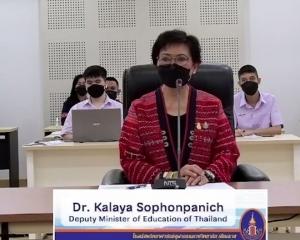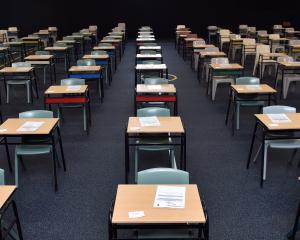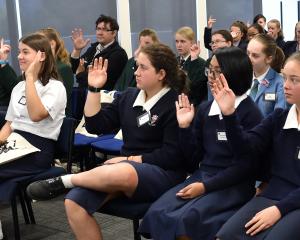More than a third of primary school children are failing writing standards because they do not read enough and are confused by texting language and slang, experts say.
Figures made public by the Ministry of Education yesterday show more than 30% of pupils are not meeting the writing standards set by the Government.
The first round of national standards figures show 76% of children are at or above the national standard for reading, and 72% are achieving in mathematics.
But in writing, only 68% of pupils are achieving at or above the set level and experts say the lack of reading, the heavy use of text language and slang was probably affecting some pupils' writing skills.
New Zealand Writers' College principal Nichola Meyer said changes in language had been affecting children's writing skills for years.
"The language they are hearing is all jargon. There is a lot of slang and it's almost [all] phonetically based and not spelling based.
"So when they have to sit down and write something, it is completely alien to them."
The fact that English was a second language for many pupils was also a big factor, as some cultures were traditionally verbal and therefore reading and writing were not the norm, Ms Meyer said.
Reading had also become less of a hobby for children and more of a chore.
"One of the biggest determinants for a child doing well in reading and writing is the number of books in the home - not just magazines, but shelves full of books - and weekly visits to the library," she said.
"Reading and writing are all interrelated."
The results, based on figures from almost 2000 schools, are not "moderated", that is checked for accuracy and consistency between schools.
Many teachers and educational experts have criticised the system, which they claim is unreliable, narrowly focused and likely to lead to an unhealthy culture of competition among schools.
The figures show boys are doing worse than girls, 61% of boys achieving at or above the standard in writing compared with 75% of girls.
The statistics were even worse for Maori and Pasifika pupils and pupils from low-decile schools.
In writing, 58% of Maori and 54% of Pasifika pupils achieved at or above the national standard.
Ministry figures show pupils from poorer schools did not do as well as those from rich schools.
Fifty-six percent of pupils from decile 1 schools achieved the reading standard, 50% the writing standard and 52% the maths standard.
Higher-decile schools achieved scores around the mid-80% mark in all areas.
Auckland University professor Judy Parr, head of the school of curriculum and pedagogy, said writing was the "poor relation" of reading, and much more could be done to improve results.
Reading was something that needed to be encouraged among children, as it played a significant factor in a child's ability to write, she said.
"Reading is fantastic. It gives you the notions and schema of structure; it develops vocabulary.
"Any child that is driven to write, will write. It could be story writing, but not all children like writing stories. They could describe how you make something, write in detail how something works. All that helps develop better writing."
Education Minister Hekia Parata said recovery programmes existed for pupils who were not achieving in maths, writing or reading.
"We want those pupils who are doing well to do better and we need to do different things to raise the achievement of those who are falling behind," she said.
"We need to understand precisely where and how we fine-tune our education system."











